Is Israel still a somewhat backward, developing country, with a commensurate environmental policy? It depends who you ask.
With much of its 60 plus years of existence devoted to survival, environmental awareness and conservation efforts took a back seat to what were perceived as more vital issues. But thanks to a growing army of activists, scholars and researchers, the tide has been shifting, as Israelis become more aware of the importance of sustainability and a clean environment.
As Dr. Eilon Schwartz, one of the country’s top 10 environmentalists listed below, wrote in an article reflecting on Israel’s 60th anniversary, “In Israel, like around the world, environmental awareness is coming of age. For too long, the debate in Israel about “peace and security” had allowed decision-makers to avoid central social-environmental issues. As a result, there has been massive damage to the physical environment, and the social fabric needed to sustain it. But crisis often leads to opportunities, and more and more people, in Israel and around the world, are realizing that business-as-usual is not an option.
“What Israel needs most is visionary leadership for the future, which can direct the society on a path to ensure ecological health and social justice for all its inhabitants, and translate the growing awareness of a crisis into true societal change. At this historical moment, it is clear that that leadership is lacking, but also that there is an emerging movement committed to an alternative vision for Israel’s future,” he continued.
Let’s meet some of the prime movers who are forging a responsible environmental future for Israel.
1. Yossi Leshem
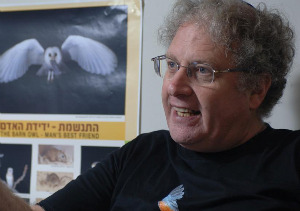
When Israelis mention birds, the name Yossi Leshem is never far off. A world renowned ornithologist, Leshem has been involved in many aspects of nature conservation, with an emphasis on bird research, for close to 38 years.
A PhD study on migrating birds in 1980 led the 62-year-old Leshem on a lifelong quest to reduce collisions between aircraft and birds. His doctoral research on migrating flocks based on his oft-repeated slogan “Migrating Birds Know No Boundaries,” has resulted in a decrease of 76 percent in the number of collisions with aircraft caused by birds, and has saved hundreds of millions of dollars, not to mention the numbers of lives, both human and avian.
In 2005, Leshem won the Mike Kuhring Prize for his achievements in improving flight safety and for his mission to connect safety with nature conservation. In 2008, he received a Lifetime Achievement Award for Environmental Protection as part of Israel’s 60th anniversary celebrations.
Leshem has several other bird-related pursuits as well. In cooperation with the Palestinian Authority and Jordan, he is involved in educational activities in some 250 schools and is introducing owl and kestrel nesting boxes to large farms as a natural form of rodent control. About 2,000 nesting boxes are currently set up across Israel.
Leshem worked at the Society for the Protection of Nature in Israel (SPNI) for 25 years, as a guide, as director of a Field Study Center, as head of the Nature Protection Department, initiator and director of the Israel Raptor Information Center between 1980 and 1991, and as the executive director of the SPNI between 1991 and1 995.
In addition, he’s senior researcher at the Department of Zoology in the Faculty of Life Sciences at Tel Aviv University, and is the founder and director of the Latrun International Center for the Study of Bird Migration. They don’t call him the ‘bird man’ for nothing.
2. Isaac Berzin
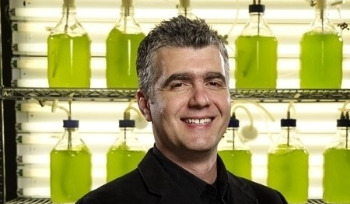
Named one of TIME Magazine‘s most influential people in 2008.Isaac Berzin is intent on Israel becoming a biofuel powerhouse.
The 43-year-old chemical engineering graduate of Ben-Gurion University of the Negev left the country and in 2001 founded the pioneering GreenFuel Technologies Corporation, a US company that aimed to use algae to eat up carbon emissions and to produce renewable energy. He returned to Israel recently to establish an international institute to formulate alternative energy policies under the auspices of the Interdisciplinary Center (IDC) in Herzliya, where he serves as a Senior Fellow.
Berzin looks to collect the best-fit alternative energy solutions from across academia and the industry in Israel – about 10 different technology platforms – to build a center of excellence, “10 times bigger and stronger than GreenFuel,” he told ISRAEL21c last year.
According to Berzin, government bureaucracy has stalled the rapid implementation of new clean technologies, despite the more than 250 companies and university bodies currently engaged in growing algae as a source of energy, which is why he’s decided to focus on setting policy.
The new institute he is currently establishing will develop sustainable and strategic global alternative energy policies and will collaborate with the Institute for the Analysis of Global Security (IAGS) based in Washington, where Berzin is also a senior fellow. “I want Israel to become an international center of knowledge in the realm of alternative energy. The world is looking for solutions in this sphere, and in my view Israel is in a very special position. The toolbox that is needed to create solutions of this kind is here.”
3. David Faiman
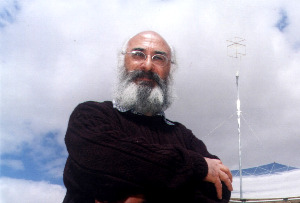
David Faiman is not afraid to look straight into the sun.
The 66-year-old engineer and physicist has become synonymous with solar power over the past 30 years. He’s director of the Ben-Gurion National Solar Energy Center and chairman of the Department of Solar Energy & Environmental Physics at Ben-Gurion University’s Jacob Blaustein Institutes for Desert Research in Sde Boker. The immigrant from England also assisted in establishing the Blaustein Institute in 1976 and has been working ever since in the field of applied solar energy.
His concentrated photovoltaic cells systems collect sunlight and use it to generate electricity.
“What we’ve done is simply split those two functions, so that the sunlight is collected and concentrated by a dish-shaped mirror, and a small number of concentrator cells generate electricity from that highly-concentrated sunlight,” Faiman tells ISRAEL21c, describing his apparatus which resembles an enormous satellite dish, and rises high above his modest offices in the middle of the Negev desert.
The country’s first solar energy farm was launched this year by the company ZenithSolar, based on the Concentrated Photovoltaic (CPV) systems developed by Faiman. The system is designed to harvest more than 70 percent of incoming solar energy (as compared to industry norms of 10% to 40%). In its first stage, the solar farm, based at Kvuzat Yavne, will generate electricity and hot water for the kibbutz. At later stages it will provide energy for other neighborhoods as well.
Faiman lives in Sde Boker in a ‘passive solar’ house, which is built with angles and window sizes precisely calculated so that all of the house’s heating and cooling needs are taken care of by the sun.
4. Alon Tal
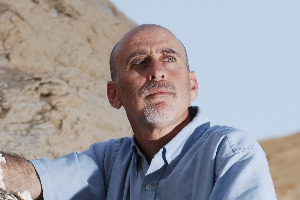
A young environmental visionary, Alon Tal’s undertakings have produced tangible accomplishments in reshaping Israel’s clean air, water, and soil policy.
At age 29, he founded The Israel Union for Environmental Defense (Adam Teva V’din, in Hebrew), to fight for Israeli environmental rights. Considered Israel’s most effective environmental organization, it has won countless legal actions, garnered more stringent regulations, tougher enforcement policies, and increased environmental initiatives.
A member of the Mitrani Department of Desert Ecology of Ben-Gurion University’s Jacob Blaustein Institutes of Desert Research in Sde Boker, Tal is also the founder of the Arava Institute for Environmental Studies. His primary research focus is in water management and policy, with an emphasis on joint Israeli-Palestinian environmental projects.
An American immigrant to Israel who ran for the Knesset in the last elections on a ‘green’ ticket, Tal received a Lifetime Achievement Award for Environmental Protection from Israel’s Ministry of Environmental Protection, recognizing his work on behalf of safeguarding Israel’s environment as part of the country’s 60th anniversary celebrations. BGU president Prof. Rivka Carmi described Tal as “both an exemplary academic and an environmental leader, who transformed Israel’s environmental movement and its approach to ecological challenges.”
Tal has coauthored and signed a model for an agreement on environmental cooperation between Israel and the Palestinian Authority with Dr. Mohammad Said Al-Hmaida from Bir Zeit University, covering all aspects of the shared environmental issues, including environmental impact statements, hazardous materials, air quality, nature preservation and solid waste.
5. Naomi Tsur
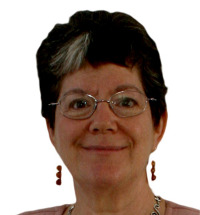
One of Israel’s most important green advocates, during her time with Sustainable Jerusalem Tsur has helped to organize 75 green groups together under one umbrella, teaching activists how to lobby in the government, and how to hone in on specific issues worth fighting for.
“Ensuring a sustainable environment in Israel is a pre-condition for sustainable peace, and a sustainable economy,” she tells ISRAEL21c. “If from the realm of civil society you perceive environmental sustainability as an essential goal, then it has to be essential for whoever holds the reins of the government, doing from the inside what I did on the outside.”
6. Eilon Schwartz
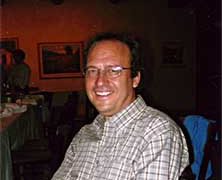
Called the ‘philosopher’ of Israel’s environmental movement, Dr. Eilon Schwartz is executive director of the Heschel Center for Environmental Learning and Leadership, dedicated to the building of a sustainable future for Israel rooted in environmental health and social justice.
The center runs a number of important programs – including the Environmental Fellows Program for developing the next generation of environmental leadership in Israel; a nationwide network of schools focused on environmental education and activism; Israel’s Local Agenda 21 – a global network of municipal governments and citizen groups devoted to integrating social, environmental and economic interests into a holistic vision of local development; and the Media Initiative – engaging senior Israeli journalists with social-environmental issues.
The Heschel Center receives its inspiration from the work of the great 20th century Jewish thinker and activist Abraham Joshua Heschel, who worked for social justice and the integrity of the natural world.
An American immigrant to Israel, Schwartz is also a faculty member of the Melton Center for Jewish Education at the Hebrew University of Jerusalem, where he teaches advanced degree courses in Judaism and environmental education, the interrelationship between Zionism and the environment, environmental policy and ethics.
Regarding his work at the Heschel center, Schwartz says, “We bring together Jews and Arabs, religious and secular, Oriental and European Jews, believing that environmentalism should reflect a larger, inclusive vision for the society.”
7. Ahmed Amrani
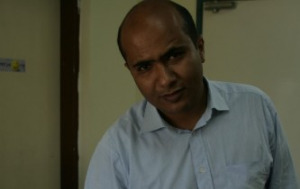
The municipal chief of staff of the Bedouin city of Rahat, Ahmed Amrani is at the forefront of raising environmental awareness in Israel’s Bedouin community. The 29-year-old organizer has succeeded in setting up a green organization – the Green Rahat Association, and convincing all the local school principals to include a green project in this year’s curriculum, as well as some serious neighborhood improvement projects.
The Rahat native first became interested in the environment in 2003, when, while at Achva College in the northern Negev, he met environmental activist Eran Ben Yemini, who helped him to introduce green thinking to the Bedouin population.
The Green Rahat Association has been responsible for a number of clean-up campaigns in the area, including the establishment of a community garden by local children. Trees donated by the Jewish National Fund have been planted around town, and an ongoing environmental workshop is empowering young people to shape their city’s future.
Amrani’s latest effort – in collaboration with Ben-Gurion University of the Negev, is to rehabilitate Wadi al-Hazan (known in Hebrew as Nahal Garar), a dry riverbed to the east of the city, beyond which a new residential neighborhood is planned. The valley is slated to become a large regional park.
“Ahmed has already achieved the near-impossible,” says Amrani’s friend Ben Yemini of his efforts in Rahat. “Environmentalism is in his blood. He’s immersed himself in the issue – and he’s very determined.”
8. Tzipi Iser-Itzik
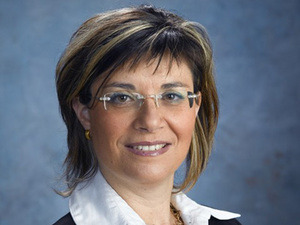
Another woman with an environmental mission, Tzipi Iser-Itzik was executive director and senior attorney at the Israel Union for Environmental Defense (IUED, in Hebrew Adam Teva V’din), the umbrella organization for Israel’s environmental groups.
IUED works to protect Israel’s environment – as a public watchdog, as a catalyst for policy reform, as a source of free legal counsel to victims of environmental hazards, and as an initiator of strategic campaigns to further environmental goals.
Iser-Itzik joined the IUED in 2003 because of an ideological commitment to improve environmental protection in Israel. She worked with the organization on three fronts: Litigation and planning actions; legislative and policy reform; and environmental justice in the community. Among her accomplishments were working with Knesset members to craft new legislation promoting air quality – the IUED-sponsored Clean Air Act, which the Knesset enacted July 22, 2008 and which was endorsed by more than 70 Knesset members.
A mother of three, she has received numerous honors for her work, including a ‘Women of Influence’ award from Israel’s Globes financial newspaper. She was also named one of the country’s ‘Women Making Changes’ by another local financial magazine, The Marker. This year she was among the honorees awarded the ‘Knight of Quality Government’ title by the Movement for Quality Government in Israel, at its annual conference.
9. Benjamin Kahn
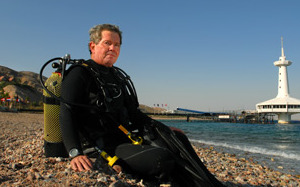
Named one of TIME Magazine‘s 45 ‘Heroes of the Environment,’ a few years ago, Benjamin Kahn focuses his energies on Israel’s coastline. As founder in 1999 and board chairman of environmental coastline watchdog organization Zalul, the marine biologist by profession has always had a love affair with the ocean.
A fan of snorkeling at the Red Sea as a child, Kahn left the country to study marine biology and lived in both the US and Australia. When he returned to Israel 10 years ago, he was dismayed to discover that the amazing coral reef had drastically deteriorated, as the result of years of human contact.
“I knew that if the reef was going to survive, someone had to fight for it,” Kahn told TIME, explaining what prompted him to launch Zalul.
In addition to winning major environmental victories in Eilat which resulted in forcing giant fish farms out of the gulf, Zalul has had numerous successes in its campaigns regarding Israel’s coastline and marine life, which have had a direct impact on Israel’s nascent environmental policies as well as on the country’s awareness of the issues.
Chief among these was clearing waste from the waters surrounding the Kishon River near Haifa. In 2005, Zalul conducted an investigative report on the river, ‘Contaminated Ground in the Haifa Gulf,’ and presented it to the Environment Ministry. As a result, the Israel Ports cleared out 75 tons of sludge from the banks of the Kishon.
One of Zalul’s main priorities for the future is to raise awareness of and involvement in the environmental issues at hand among Israeli youth. That’s why Kahn started a project in which he and other divers collect reef fragments that have broken off in stormy weather, and give them to 5,000 school kids to grow like saltwater saplings for a few months in classroom tubs. Later, divers carefully glue the living fragments back onto the reef. It’s all part of Kahn’s tikkun olam (‘healing the world’) for the sea.
10. Gidon Bromberg
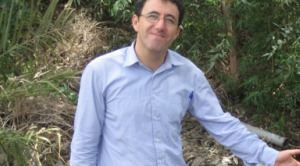
The Israeli director of EcoPeace/Friends of the Earth Middle East (FoEME), Gidon Bromberg is at the forefront of fostering environmental ties between Israel’s neighbors in Jordan and the Palestinian Authority.
Bromberg (47) founded EcoPeace in 1994 as the first regional organization dedicated to peace and sustainability and has been the Israeli director ever since. In 1997, he led the entry of the organization into Friends of the Earth International, the largest grassroots environmental organization in the world.
The environmental lawyer has also developed the cross-border, community peace-building project ‘Good Water Neighbors’, which is now seen as a model for other programs in conflict areas.
Speaking regularly about water, peace, and security issues in various forums, Bromberg has presented papers before the UN Commission for Sustainable Development, the United States House Committee on Foreign Affairs, the European Parliament and the advisory meeting to the UN High Level Panel on Security.
“The purpose of our bottom-up community work is to create a grassroots constituency for cross-border cooperation in solving concrete environmental issues on the ground at the community level,” Bromberg told the Tree Hugger website. “We see this as a first step toward developing a broader vision for each ecosystem.”













